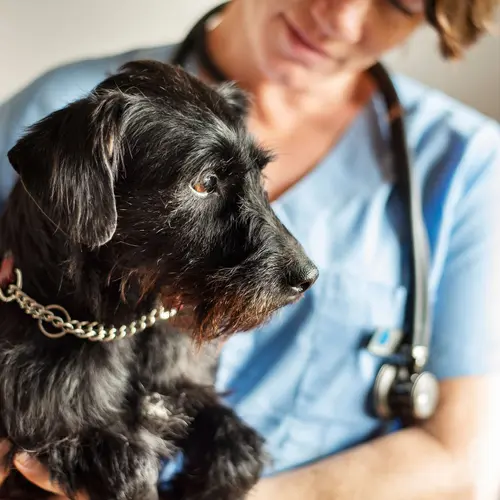Like humans, older dogs are susceptible to developing age-related illnesses like dementia. You may have noticed changes in your pet that indicate that they are suffering from some form of cognitive decline. Canine cognitive decline (CCD), also called cognitive dysfunction syndrome (CDS) or dog dementia, progresses similarly to the way it does in humans.
If a dog is going to suffer from canine dementia, symptoms typically start presenting around the age of 9. You should take your dog to see a veterinarian if you suspect they are experiencing signs of dementia. Vets typically make a formal diagnosis of CCD by using the acronym DISHA after first ruling out other medical causes of their disorientation, like:
- Diabetes
- Cushing’s Disease
- High Blood Pressure
- Loss of Hearing
- Loss of Vision
- Urinary Tract Infection
- Kidney Disorder
- Arthritis
- Skin Disorder
DISHA outlines symptoms common in dogs that have dementia.
Disorientation. Disorientation is one of the most recognizable signs of dog dementia. You may see your dog wandering around like it is lost, seemingly confused about its surroundings, or going to an incorrect door seeking to be let out. Other signs that a dog may have disorientation include staring at the floor, walls, or out into space without purpose. You may notice your pet starting to have difficulty maneuvering around objects or failing to recognize people they know.
Interaction changes. You may notice your dog showing a lot less interest in being social with other people or anything in their environment. A dog may start becoming clingier or withdrawing from others. They may stop wanting to be petted and prefer to spend time away from the family. Some canines with dog dementia may become more fearful and needy.
Sleep/Wake cycle disruptions. One of the most uncomfortable aspects of canine dementia is the change it causes to a dog’s sleep cycle. Your dog may start having trouble sleeping through the night and may end up pacing the house while barking or whining when everyone else is asleep. That can cause your dog to experience heightened emotions like fear and agitation. Your dog’s sleeplessness during the night may lead to them sleeping a lot more during the day.
House soiling, memory, and learning. Your dog’s housetraining may start slipping to the point where they stop letting you know when they need to go outside and relieve themselves. They may begin to soil various areas throughout the house, leading to even more anxiety. Dogs with dementia may also stop responding to commands or performing tricks. It may also become harder for you to get your dog’s attention.
Activity changes. Another sign of dog dementia is seeing your dog’s activity level go down. They may show less interest in exploring their environment. Your dog may also show decreased responses to external stimuli like other dogs, sounds, things, and people. Other signs of lower activity levels can include less interest in grooming, a lack of appetite, more restlessness, and separation anxiety.
Tips on Helping Dogs With Dementia
While there is no cure for dog dementia, there are things you can do to make your pet’s life easier. Ask your veterinarian about steps you can take to support your dog. Medications that can be helpful to dogs with dementia include:
- Selegiline — This drug can help your dog control many of the symptoms that come with canine dementia.
- Antidepressants — Provides relief from the anxiety that often manifests in dogs with dementia.
- Anipryl — A psychoactive drug approved for use in treating CCD.
Your vet may also recommend fortifying your dog’s diet with nutritional supplements. Other suggestions for helping canines with CCD include getting them to exercise more, buying interactive toys, and teaching your dog new skills to help with their memory and learning.
You can do other things to help your dog, like taking them on walks that encourage them to smell and avoiding any sudden schedule changes. Sticking to a routine can help relieve the anxiety often experienced by senior dogs with CCD. You should adjust your pace to match that of your dog and not force them to walk faster.
Many owners mistake the symptoms of canine dementia for “bad dog behavior” before getting them diagnosed. Try to remain calm and exercise patience when your dog does things like soiling the carpet or waking you up in the middle of the night with their barking. You want to avoid making them more nervous and scared.
Try to keep the layout of your home the same and keep things as neat as possible. Changing the position of a sofa or leaving clutter around can make things more stressful for dogs with CCD. Your dog should always find their food and water bowl in the same place, so they don’t run into issues when looking for food.


